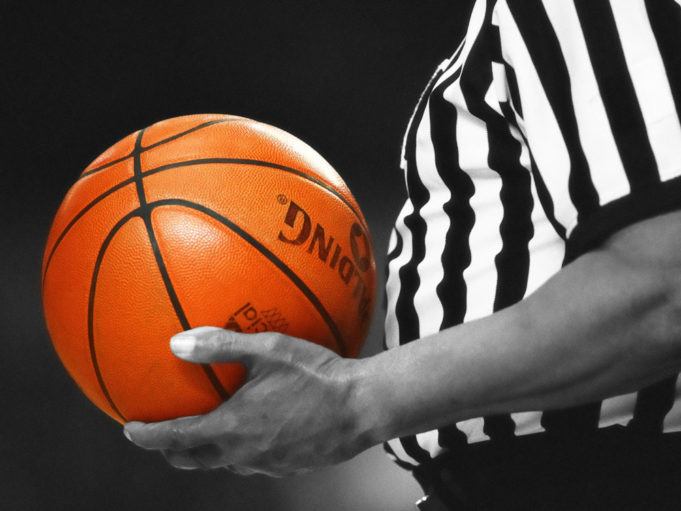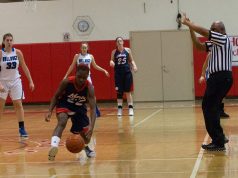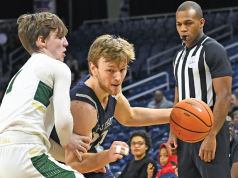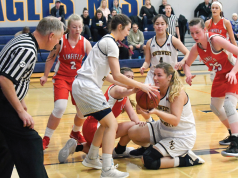Supervisors want officials to master the fundamentals, creating good habits and developing a consistency to their game — characteristics shared among the elite in the world. Those qualities are particularly important to play-calling, even more so, play-calling from primary and secondary coverage responsibilities.
First, let’s go back to basics to master the fundamentals. Do you understand your primary coverage responsibilities from each position? Some of the greatest resources we have are our mechanics manual and personal video. When was the last time you picked up the mechanics manual or watched yourself on video? There are no magic spots on the floor, but the understanding of those guidelines in positioning will lead to play-calling success.
A great exercise is to watch your own video, hitting the pause button and taking “snap shots” of yourself in various positions on the floor. That will tell you a lot about your current strengths and areas for improvement.
Once you identify areas for improvement, the next step is to ask, “Why?” When you identify why you made a mistake, you are on the path to personal growth. A few of the questions to ask yourself during video review:
- Do I have an open look with the ability to officiate the defender, seeing space between the defender and offensive player while also seeing the point of contact?
- Is my head position looking at my primary coverage responsibility? Where are my eyes?
- Does the overall image I portray project confidence, strength and presence?
Watch officials at levels beyond your current experience, focusing on how they cover the floor and the discipline of their whistles. The best piece of advice I’ve heard is, “Success leaves clues.” Find a model or models and see what they do that leads them to success. Watch the officials working the NCAA tournaments or the G-League/NBA/WNBA playoffs. They are perceived to be the best in their field. However, it is important to understand that while watching higher levels there may be some fundamental differences in their coverage and mechanics. The mechanics manual is a great place to start or revisit throughout the season, and during offseason development to get back to basics and begin to think in more advanced terms on play-calling.
The two most important words for those who have success with primary and secondary coverages are trust and discipline. Do you trust the system, the mechanics and your partners? By developing trust, you will begin to see you’re an official who others like to work with and who makes the crew better. Data shows that a large percentage of our play-calling mistakes occur when we whistle out of our primary, or have a high number of secondary whistles. A higher number of secondary whistles equates to a lower play-calling percentage, and a lower number of secondary whistles equates to a higher play-calling percentage. Sometimes a secondary or cadence whistle is required, but knowing and being able to identify those plays is important to our success.
How do we reduce our secondary whistle counts? Know your primary coverage area (PCA). Call the obvious plays in your PCA, not only plays on-ball, but off-ball. There is an emphasis on freedom of movement at all levels and most often those plays occur off-ball. Being a good off-ball official requires discipline and an understanding of your coverage responsibilities. Being able to call obvious plays in your PCA will allow others the ability to trust you on plays that are not open to them out of primary. It all comes back to trust and discipline.
When was the last time you watched a game and the trail’s whistle beat the lead’s on a crash play in the middle of the lane? Does that show trust among the crew? Discipline with your whistle? Or an understanding of the mechanics? No, no and no. One of the biggest mistakes officials make is thinking that they need to inject themselves into the game. You will see that at many hiring camps. It is true you must be able to call plays and, at times, be aggressive, but some of our best decisions in play-calling are the plays you no-call, or plays involving marginal but not illegal contact.
Beyond having discipline, patience and trust, work with the mentality that you will only blow into secondary coverage when you have an open look and are able to observe the entire play from start to finish. Or that you will only blow on plays in secondary that demand a whistle and are of high certainty. By doing that, your perceived play-calling IQ will increase beyond your officiating experience. Marginal plays out of your PCA often create a negative reaction from the players and coaches. Those are the types of plays that lead to technical fouls that your supervisor or coordinator cannot defend. You can save yourself a headache or two by incorporating the fundamental of not whistling out of your PCA on marginal plays or plays with a closed look. I heard one of the best teachers of the craft say, “If I blow out of primary, it must be a strike.” That type of play should be one that when you go to the video, you only have to look at it one time, the type of play your partner thanks you for at the next opportunity.
Make those fundamentals and disciplines part of your plan and who you are each game. Create a consistency your partners, supervisor/coordinator and stakeholders can trust. If that is not you, how soon can it be you?
What's Your Call? Leave a Comment:
Note: This article is archival in nature. Rules, interpretations, mechanics, philosophies and other information may or may not be correct for the current year.
This article is the copyright of ©Referee Enterprises, Inc., and may not be republished in whole or in part online, in print or in any capacity without expressed written permission from Referee. The article is made available for educational use by individuals.


















